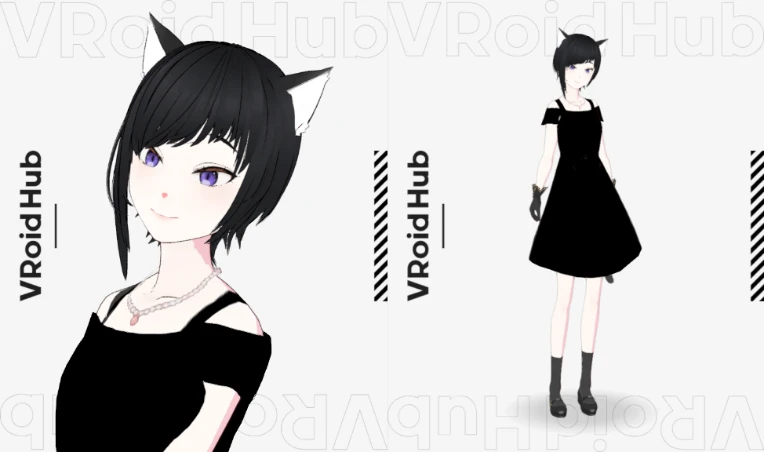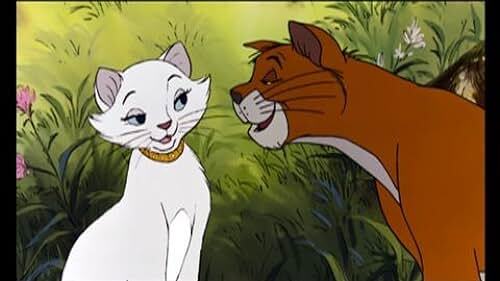I love English and was once good enough to become an English teacher at a Japanese junior high school. But that was in the past, and since then my English skills have been declining rapidly. So, as part of my language learning, I decided to post some simple questions and comments about the English language that are not easy for me (and that I should ask on HiNative or Quora) on Newgrounds. I am not an expert in English and may make elementary mistakes, but thank you for your patience.
“Ojou-sama Language” in English | English Is Not So Easy 24
Recently, I created an original character named VOFCAT, and I wanted to make a 3D avatar of her. When I created her using VRoid, I was surprised at how much cuter the character turned out compared to when I draw illustrations myself.

By the way, in Japan there is a group of people called "ojou-sama (お嬢様)," who is a noble and refined girl or lady, and there is a concept known as "ojou-sama language."
Especially in anime, there is "ojou-sama laugh (お嬢様笑い)", in which an ojou-sama laughs with an "ohoho" sound, and this type of character also speaks a unique form of Japanese that is slightly different from the Japanese used by ordinary Japanese speakers, and this is called "ojou-sama language".
This made me wonder if there was an "ojou-sama (refined lady) language" in English that might be equivalent. I have been doing some research on this, and in my exploration I have stumbled upon some fascinating discoveries in the enchanted forest of English. In this article, I'll share what I found. This time, as always, the content is a bit scattered, so I hope you can read this not so much as a helpful guide to learning English, but as a casual record of my own English learning journey.
1. How do you do?
According to dictionaries, this phrase is defined as a greeting used when meeting someone for the first time, but it’s considered very old-fashioned and overly formal by native English speakers. In that sense, Japanese ojou-samas are famous for greeting with "御機嫌よう (gokigenyou)," which could be seen as the equivalent of "How do you do?"
While researching usage examples, I found out that a song with the same name was played on the Disneyland attraction "Splash Mountain." However, as a non-native English speaker who has never even been to Disneyland in Tokyo, my investigative skills have limits, so I couldn’t figure out why this song was used, what the story was, or why the attraction was closed.
2. I'm delighted to meet you.
Like "How do you do?" this expression is also used when meeting someone for the first time. Some literature suggests that "delighted" is a word that can be replaced with "happy," but using this word makes it sound more like an ojou-sama.
- "I'm delighted to meet you."
- "I would be delighted if you could..."
- "I would be delighted to..."
While the text indicates that this is formal language that even ordinary people can use, I imagine there are quite a few native speakers who would be surprised to hear someone use "delighted" instead of "happy."
Also, you can use the expression "How delightful it is!" to convey that something is wonderful. Would that also sound ojou-sama-like?
3. And you?
In Japanese textbooks, students are taught to respond to "How are you?" with "I'm fine, thank you. And you?" This phrase is not only completely unusable in American daily conversations, but also, according to a native speaker (Kevin from KER), "And you?" sounds like something a princess or noble lady would say at a ball.
There are also texts that discuss ojou-sama-like responses to "How are you?" and one of the examples introduced was "I'm quite well." Apparently, the word "well" gives it a British English vibe.
4. Pardon? / I beg your pardon? / Pardon me.
Japanese people tend to struggle with understanding native English speakers, so these phrases are taught early in English learning. However, it seems that "pardon" sounds a bit too aristocratic for Americans to use in everyday conversation. Interestingly, in Britain, it’s not such an unusual word, and some people use it daily.
Speaking of which, as in the previous example, many Japanese English learners believe that ojou-sama speaks British English. While I understand that there are different people in America and Britain, I wonder how accurate this image is. Is British English ojou-sama language?
5. May I have the pleasure?
Here, "the pleasure" refers to a dance, and it’s a phrase apparently only used at balls. This is a great example of a context that can’t be understood from the phrase alone unless one shares a certain cultural background in the English-speaking world.
A similar phrase in Japan is "Shall we dance?" which became famous because a movie with the same name was a big hit in Japan. The movie was apparently remade in Hollywood, so perhaps many people remember it from there.
By the way, in response to the main topic of this article, "Teach me Ojou-sama-like English phrases!" some of you may want to reply, "Learn from the way this character in this movie talks!" I agree. I would give the same advice if I were in your position. So, I decided to follow that advice, even though it hasn’t been given to me yet.

Specifically, I enjoy an early Disney work, "The Aristocats," which is about noble cats living in France. In that movie, Duchess (left), the mother cat, is a very beautiful and graceful lady, and I suspect her way of speaking might be close to "ojou-sama language" in English. I sampled her language, especially her conversation with the gentleman cat, Thomas O'Malley (right), who appears in the middle of the story, and I’ll share that in this article.
6. What might your name be?
This phrase was spoken by O'Malley, and I thought it was a very elegant way to ask someone’s name instead of saying, "What is your name?"
7. I am really in a great deal of trouble.
This phrase, spoken by Duchess, is a very glamorous way of saying "I'm in trouble," so I made a note of it. With both "really" and "a great deal" included, it clearly conveys that she’s in significant trouble.
8. If you would be just so kind and (show me the way)
I thought this could be a useful phrase when asking for a favor. In Japanese textbooks, the most polite way to make a request is "I was wondering if you would...," but this phrase is equally beautiful.
By the way, when asking someone to do something, I tend to use "Would you...?" instead of "Could you...?". Although I'm not a native English speaker, I feel that the former asks about the person's willingness, while the latter asks about their ability, and I personally feel that asking about someone's ability might be a bit impolite, so I tend to choose "Would you...?". I wonder if Duchess has a similar philosophy.
9. How can we ever thank you?
No gentleman in this world could refuse a request from a beautiful lady like Duchess. As expected, O'Malley responds, and Duchess’s thank you is again expressed in very beautiful English.
My personal opinion is that including "we" in this phrase gives the impression that "you have saved my family," making it a better expression than "Thank you very much!"
This is totally off topic, but have you ever said or been told, "Haven't we met before?"
I've heard it a lot in movies, but I've never encountered it in real life. So I'm sure if I used the Japanese translated version in my everyday conversation (前にどこかで会った or something), the person would definitely respond, "What? Are you an American?" But this is one of the phrases I want to encounter in my lifetime.
By the way, Madame Duchess's response to this phrase was, "Oh, and I'm so very glad we did this morning."
This is the end of this article. Thank you very much for reading this far.
Finally, I sometimes wonder why I'm so drawn to non-practical languages that I don't even use myself, and I recently realized that it's because I admire the English I've encountered in the worlds of stories. By researching what "ojou-sama" English" is, I believe I can better understand the personalities of characters in Hollywood movies and Nickelodeon cartoons, and gain a deeper understanding of these works without relying on translations. Such insights, I believe, will certainly enrich my life.
[For Japanese Learners]
If someone asked me to teach them "ojou-sama language" in Japanese, I would say, "Just watch Salome's streams." As for speakers of "ojou-sama language" in Japan, I think the most famous one is the VTuber (virtual YouTuber; online entertainer who uses a virtual avatar created by computer graphics), "Ichi Hyakumantenbara Salome (壱百満天原サロメ)".
I believe that analyzing her way of speaking would give a general understanding of this style in Japanese (although the task seems rather tedious).
That aside, I believe that it is generally very beneficial for your language learning to listen to the streams of a VTuber who speaks the language you want to learn. Recently, I've been looking for VTubers who speak Spanish (preferably Español Latino, spoken by Mexicans) and German (Hochdeutsch), so if anyone has any recommendations, please let me know (I already have a favorite Californian English speaker for English).